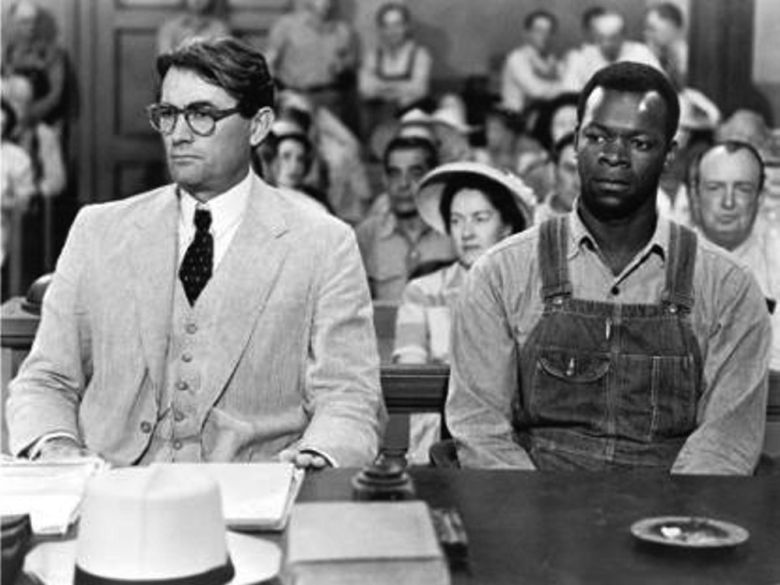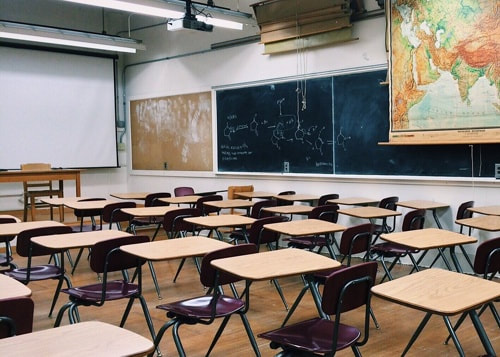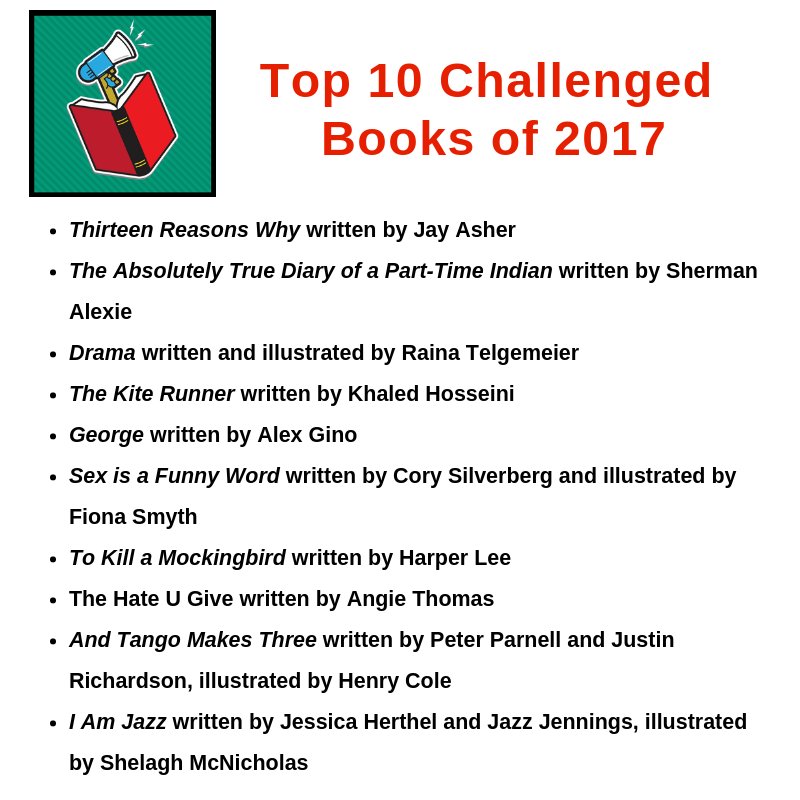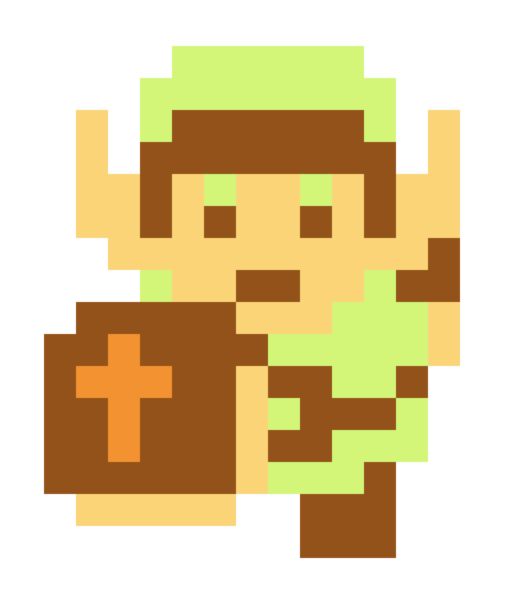|
I saw an article the other day, saying that Harper Lee's To Kill a Mockingbird has been taken off reading lists and how this is a deathblow to anti-censorship across the country, again. So, I crack the fucker open (the article, not the book) and come to a realization: Are we supposed to truly care about this? I've suspected for years, now, that the whole Read a Banned Book trend has been a front us artists use to pretend like we give a d*mn about free speech. If I was resourceful, reliable, or professional, I'd cite the article that inspired this one. Unfortunately, I lost it. There are dozens out there, and they're all the same. I'll include some at the end of this tirade. To Kill a Mockingbird is one of my favorite books, possibly in my top ten. I also think the movie adaptation is a masterpiece of American cinema. Heck, I even enjoyed Go Set a Watchman. It's no proper sequel to TKAM, but for a rough draft by a first time author, I think it's beyond impressive. The original novel has shaped my morality on a daily level and I often find myself asking, “What would Atticus do?” I think it's the perfect combination of a nostalgic lookback of a childhood summer while framing Scout's coming of age within a larger societal context with the tragic trial of Tom Robinson (not to mention, as both a horror fan and a social outcast, Boo Radley). Do I think that everyone should read this book? Yes, I do. Do I think people should listen to what some bum on the internet tells them to do? Never. Literature's been around a lot longer than the Finches and it's come a long way since they've made their mark. I don't think the book is dated, but I do think it's more mature than most high school classrooms (at least those I've been in). It was assigned reading for my tenth grade class and it honestly didn't leave much of a mark on me, not until I reread it one summer between semesters at college. I completely sympathize with teachers who might be reading passages from a book with racial slurs or themes like false rape accusations. Yes, it is the teacher's job to contextualize these things in order to enrich a classroom historically and culturally, but I'm also not opposed to classroom copies of the book that censor the really nasty words. I think the blunt vulgarity is more effective and is necessary to show the harsh reality of racism. I also fear that this censorship could be a slippery slope. I don't know how to feel about it, honestly, and I see why many would rather just retire the book to a comfy slot in a library shelf. Look, I think some of the books in the image below (Top 10 Challenged Books of 2017) are pure shit. I'd rather nobody read them but I wouldn't take away their choice to do so. I also would never make some of them required reading. (Perhaps, this is more a debate for teachers to have among each other than it is for me to have with myself as a writer. The one piece of advice you can take from me is to never listen to what I say. Truly, I don't have faith in artists today as flag-wavers of anti-censorship. We might stand up for those armored with canonical status. Do I see us standing up for our contemporaries? I think many of us are more likely to eliminate the competition through any means necessary. I hope that I'm wrong. We live in a confused time where Barnes & Noble can sell Mein Kampf without criticism. If I want to wank to videos of Hitler giving speeches, I could have done so for a lot longer than I could have found an official Alex Jones video. When it comes to censorship, it seems to me as though the dead are safe in their crypts. Now, political debates are waters my silly publishing house doesn't dip its toes into (If you're one of those people going, "This article is a political statement in and of itself, you hypocrite." You're probably an insufferable twat, but you did catch me by my slimy tail.), but what can be said for all these authors who have their books canceled due to Twitter controversies? (Admittedly, many have pulled out of the deals themselves, but it begs me to wonder, how much were they strong-armed into backing-out?) Long Shot Books was created as a safe space for dangerous art. With all this said, what constitutes a work of literature being so important that it is required reading in the educational system? The answer to that one is far out of my reach. I don't have the answers, any of them, but I've got a fuckton of questions. It seems to me that articles such as this one are written to make sure the controversy remains stirred until the next potential threat to Lee's masterpiece comes around. Personally, I think the Finches will be safe for some time; it's us living writers I fear for. Thinkpiece on NBC News: https://www.nbcnews.com/think/opinion/why-are-we-still-teaching-kill-mockingbird-schools-ncna812281
TheStar, “Why It's Time to Move on From To Kill a Mockingbird in Schools: https://www.thestar.com/life/opinion/2018/11/07/why-its-time-to-move-on-from-to-kill-a-mockingbird.html WLHSnow: “Why 'To Kill a Mockingbird' Should be Taught”: https://wlhsnow.com/top-stories/2018/05/09/why-to-kill-a-mockingbird-should-be-taught/ Washington Post, "Do We Still Really Need Banned Books Week?": https://www.washingtonpost.com/entertainment/books/do-we-really-still-need-banned-books-week/2018/09/26/80e924be-c0fd-11e8-90c9-23f963eea204_story.html New Yorker, “In Y.A., Where Is the Line Between Criticism and Cancel Culture?” https://www.newyorker.com/books/under-review/in-ya-where-is-the-line-between-criticism-and-cancel-culture Vulture, “The Latest YA Twitter Pile On Forces a Rising Star to Self-Cancel”: https://www.vulture.com/2019/01/ya-twitter-forces-rising-star-author-to-self-cancel.html USA Today, “Author accused of shaming black Metro employee for eating on train; book deal halted”: https://www.usatoday.com/story/life/books/2019/05/11/natasha-tynes-book-deal-halted-amid-metro-shaming-backlash/1176291001/
0 Comments
Leave a Reply. |
CategoriesArchives
August 2023
|





 RSS Feed
RSS Feed